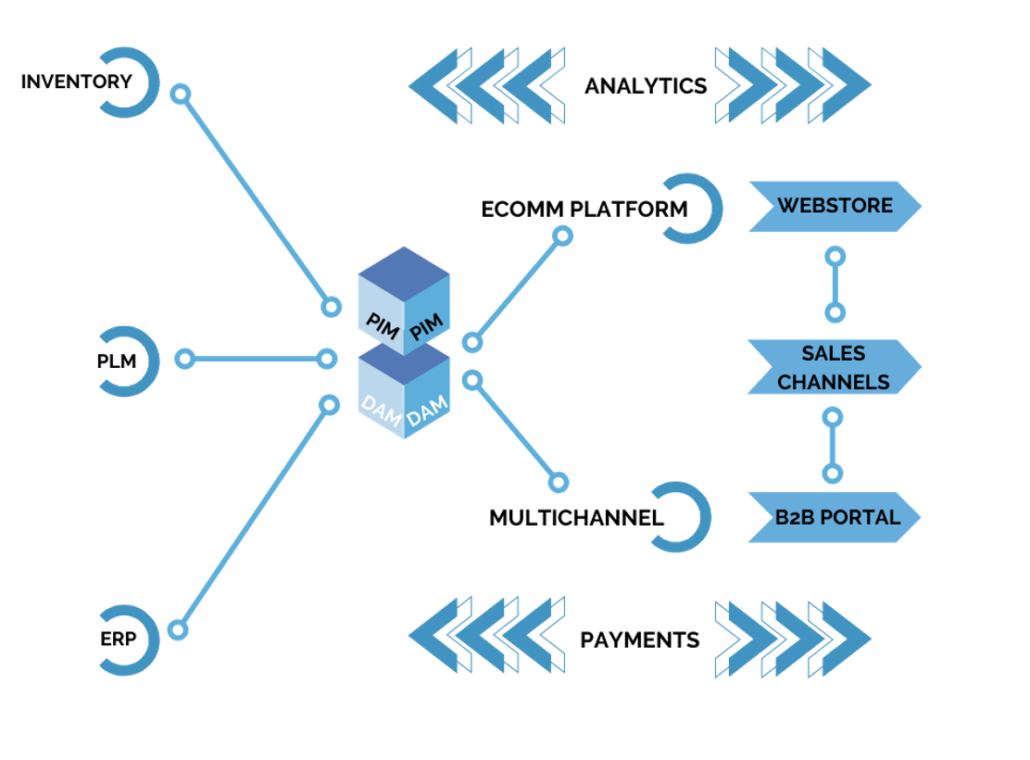Product Data Quality: 4 Ways to Enhance Product Data
Product data quality sits at the center of modern commerce. From eCommerce sites and marketplaces to ERP systems and printed catalogs, every customer interaction depends...
Published: Jul 18, 2022 Updated: Dec 23, 2024
Rich product data is key to eCommerce success. Informative product data removes uncertainty and helps consumers make informed buying decisions. Giving your customers confidence will contribute to more sales. As your business grows it’s important to consider how you manage your product data.
You might be managing your data in Excel or an ERP system. But to really harness the awesome potential of your products, you need software that’s designed to manage product data. This is where Product Information Management (PIM) shines.
Ready to take your eCommerce strategy to the next level? Here are five crucial signs that indicate you need a PIM solution:
Product Information Management is a system or process that helps businesses manage, centralize, and distribute product data across various channels and platforms. A Product Information Management system ensures that product details are accurate, consistent, and up-to-date.

A Product Information Management system streamlines the process of centralizing product data, ensuring data quality, and enabling efficient distribution across sales and marketing channels. It is crucial for managing product descriptions, specifications, pricing, and media assets, providing a single source of truth for all product-related information. Businesses rely on PIM to meet customer expectations by delivering accurate and relevant product data across all touchpoints.
Organizations in industries like retail, e-commerce, manufacturing, and wholesale use PIM software. Teams that benefit from PIM include product managers, marketers, content creators, and sales professionals. These users leverage the information management PIM system to enhance operational efficiency and ensure a seamless customer experience through consistent and reliable product information.
PIM simplifies product launches by centralizing product data and ensuring its accuracy across all platforms. This reduces errors and eliminates manual data entry, allowing teams to meet tight deadlines and reduce the time to market. By implementing a PIM, businesses can maintain consistency in product descriptions, images, and other details across sales channels. This makes the launch process faster and more efficient, ensuring products are introduced to the market in a way that aligns with customer expectations.

There are many reasons why brands need a PIM. It improves data quality, ensures consistency across channels, and enhances the customer experience by providing accurate information. PIM systems automate repetitive tasks, saving time and reducing errors. For businesses wondering why use a PIM, the answer lies in its ability to meet the growing complexity of product data management while supporting faster time to market. Additionally, why do you need a PIM tool? To scale operations, expand into new markets, and provide a consistent experience for customers in an increasingly multichannel world. This is why PIM is important and why it has become indispensable for modern businesses.
Managing thousands of product SKUs can be time-consuming. Each SKU comes with its own unique data, which covers everything from pricing and style to product size, color, and material. As a result, you’ll be dealing with hundreds of data points for a single product!

Keeping track of all this information manually is a huge task and it’s easy for data to be lost.
PIM removes the pressure of managing a high volume of SKUs. Firstly, it provides a single source of truth for your product data. Secondly, it’s easy to track and organize all the information, ensuring consistency and accuracy.
Rich product content is at the heart of the customer experience. Detailed product descriptions, high-quality images, and accurate measurements contribute to a memorable shopping experience. In other words, you can help your customers make a purchase they will love!

PIM gives users the power to create unique product descriptions that appeal to consumer emotions and needs.
Moreover, you can incorporate digital assets with Digital Asset Management (DAM). Overall, digital assets create an immersive buying experience by enhancing the look and feel of your products.
Growing your business means expanding the channels that you’re selling products through. This could mean expanding into mobile, which has become one of the most popular eCommerce channels on the planet.

By 2024, 45% of the US eCommerce market is expected to be made up of mobile online shoppers. Additionally, 67% of customers use retail apps to make purchases, indicating a sharp increase in app installations.
Increasing sales in various marketplaces and gaining new clients can be accomplished by selling through multiple channels. PIM offers crucial value by making channel development simple. Therefore, it’s easy to set up and manage different channels whether you want to sell things on eBay or Amazon.
You must accommodate varying client expectations because different channels and marketplaces have varied product data requirements and customer populations. Having a central database to store product information makes it simple to customize your data for these channels.
For companies looking to enter new markets, international eCommerce represents a significant growth opportunity. China is a major new player in the eCommerce business, with over 55% of sales occurring online. As a result, this shows that brands aiming to expand internationally have enormous sales potential.
Overall, knowing the language and purchasing habits of customers in many countries is essential to effective international eCommerce. As a result, localizing product data to satisfy these demands is essential to expanding your eCommerce business internationally.

Managing and storing your product catalogs for many locations is made simple with PIM software. Additionally, it allows you to comply with various countries’ product data laws by providing consistent information about things like material and sizing.
In the US alone, product returns cost eCommerce businesses $400 billion, making them a frequent problem. Because the items didn’t live up to their expectations, 47% of consumers returned them.
Inaccurate information is another frequent cause. About 22% of returns are due to a product’s appearance differing from what was shown online.
Nonetheless, PIM software allows you to examine all phases of a product’s lifetime and obtain clear visibility of your product data. Give customers just enough information about a product to enable them to make well-informed decisions.

Digital assets, such as pictures, movies, size charts, etc., are also crucial in this case. They provide the buyer with a more thorough view of the item they are purchasing. All things considered, finding pertinent imagery to use on your product pages is made simple by integrating DAM capability with PIM systems.
If any of these signs sound familiar, then you’re ready to implement a PIM solution. With the eCommerce industry continuously growing, product data is going to become more important. So, focus on your product information to increase revenue, build relationships with new consumers and transform your eCommerce strategy.
As the world’s most powerful PIM platform, Pimberly will totally transform the way you manage your product data. Create immersive and powerful buying experiences to increase your online sales. Optimize your products for search engines and improve how they rank.
Online activity is on the rise, so get your products in front of the right people at the right time. Start your PIM journey with Pimberly and step up your eCommerce game!


